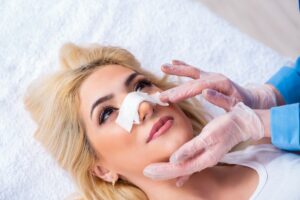 Before your aesthetically improved nose is fully revealed, you must go through a healing process. The rhinoplasty healing process really continues for up to a year or longer, but the first few weeks are especially critical. When recuperating from rhinoplasty, it is essential to avoid certain activities until your healing has progressed enough. Most patients are getting back to most of their daily activities between three and six weeks after surgery. Top Washington facial plastic surgeon Dr. Jonathan Grant of Cascade Facial Surgery & Aesthetics explains what you should avoid during your rhinoplasty recovery.
Before your aesthetically improved nose is fully revealed, you must go through a healing process. The rhinoplasty healing process really continues for up to a year or longer, but the first few weeks are especially critical. When recuperating from rhinoplasty, it is essential to avoid certain activities until your healing has progressed enough. Most patients are getting back to most of their daily activities between three and six weeks after surgery. Top Washington facial plastic surgeon Dr. Jonathan Grant of Cascade Facial Surgery & Aesthetics explains what you should avoid during your rhinoplasty recovery.
Stay Out of the Sun
Catching some rays after rhinoplasty is not a good idea. Exposing a newly reshaped nose to the sun can result in discoloration — or worse. Once the doctor allows you to participate in outdoor activities, always wear sunscreen and a hat to protect the skin on your nose from UV rays.
No Makeup
Expect bruising on your face post-surgery. The bruising is usually especially evident around the eyes. While it is tempting to cover the bruises with makeup, do not do it. Makeup applied to the skin during healing may cause serious complications, including infections.
Remove the Glasses
Because glasses rest on the bridge of the nose, a patient relying on them must find alternative means of seeing clearly during recovery. That means using contact lenses during this period for most people. Using glasses can result in damage to the healing tissue, cartilage and bone. Special cushioning pads made of silicone can be used to let you put your glasses on once your nose splint is removed.
No Strenuous Exercise
After most surgeries, patients are advised to avoid strenuous exercise for several weeks, and rhinoplasty is no exception. Too much exercise can disrupt healing and result in bleeding and other issues. While most patients must refrain from exercise for about three weeks, it can take six weeks or more to participate in certain activities, such as swimming. Basically, the no strenuous exercise rule applies to any heavy lifting, bending or the like. Your surgeon will let you know when you can resume such activities.
Not Blowing Your Nose
It is vital to avoid blowing your nose in the first three weeks of your rhinoplasty recovery. Unfortunately, controlling nose-blowing is not always possible. That is why patients should make sure they are not in the presence of anyone who is ill. Use hand sanitizer, practice social distancing and stay away from large gatherings.
No Touching the Nose
It is not until you deliberately try to stop touching your nose that you realize how many times a day you tend to do it. Any sort of nasal pressure, however, could distort the cartilage and affect the surgical results. Your doctor will give you tips on how to keep from touching your nose, whether it is while washing your face or putting your clothes on.
Learn More About Rhinoplasty
For more information on rhinoplasty and what it can do for you, call Cascade Facial Surgery & Aesthetics today at 360-336-1947 or contact us online to schedule an appointment for a personal consultation with Dr. Jonathan Grant.







